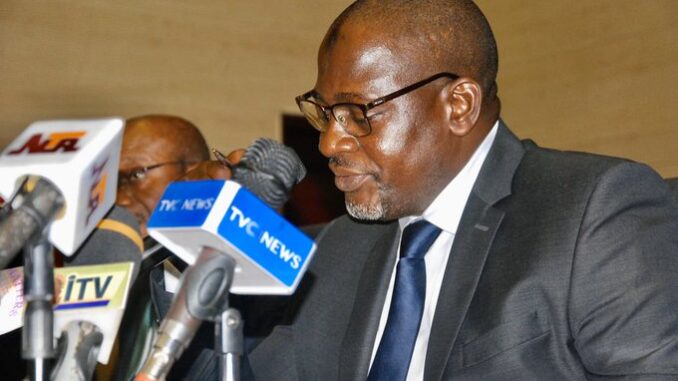
Muhammad Nami, Chairman of the Federal (Board of) Inland Revenue Service (FIRS), seems to have a made of hobby of whining about his predecessor, Babatunde Fowler’s past policies. Recently, he said the FIRS “keeled over” under Fowler, leaving him the “daunting task of rebuilding it from scratch’. Despite his claim, a considerable number of staff alleged Nami is nepotistic and his policies, divisive.
For instance, five of those he recently hired as contract staff and made directors are of his Nupe ethnicity. Not a few saw the hiring merely as ‘jobs for the boys’ and reason being that the service is not in short supply of competent hands to handle what they are hired to do. Besides, complaints are rife over selective promotion, vindictive redeployment, or sack of those he perceived as Fowler’s lackeys. In addition, the so-called ‘Fowler’s lackeys’ are disadvantaged in internal appointments, whether as heads of units or departments and not assigned any major role. However, this scenario contrasts sharply with the FIRS chairman’s narrative that staff members are happier and being treated better since he took over.
It will become clear through this intervention, based on available facts, that Nami’s allegations against Fowler are unjustifiable. Firstly, the allegation that Fowler hired consultants who collected tax on behalf of FIRS is false. Rather, the consultants were to audit over 400,000 companies across the federation, so as to determine if they were paying accurate taxes to government. The period of the tax audit spanned two years (2015-2017) and the assignments were executed alongside FIRS staffers. Explaining the rationale, Fowler at a meeting of the Joint Tax Board (JTB), in November 2015, said it would be impossible for FIRS staff to carry out audit alone given the sheer number of companies involved. He explicitly stated the “the law does not allow them (tax consultants) to undertake assessment (or) to collect revenue on behalf of government” and their duty would be to assist FIRS staff in data collation.
Secondly, it is noteworthy that Fowler’s problem started following certain decisions he took, which didn’t go down well with some entrenched forces in the FIRS.
One of such was his cancelling “Authority To Incur Expenditure” (AIE), a requisition for reimbursement for official expenses incurred. Before then, a director, for instance, could claim up to N700,000 as incurred expenses in a month. Seeing abuse of the AIE and to instil transparency in procurement, Fowler decided to vet requisition for reimbursements. One would expect the current management to stick to this policy of accountability. But, no!
Instead Nami, in March, re-introduced the AIE and approved N2million for himself without limit. Others such as directors, tax controllers, departments’ heads etc. are given approval limit of N1million on monthly basis.
Another Fowler’s sin was bonus payment he said should be paid all cadres of staff and which prior was exclusive bounty to few senior staff. What followed these decisions were specious petitions to the Presidency, National Assembly, Department of State Service (DSS), and unfounded allegations in the media.
Moreover, contrary to the allegation of skewing staff recruitment in favour of southerners, more northerners got into the service under Fowler. Both the National Assembly and Federal Character Commission (FCC) vetted and found the exercise to be fair and in compliance with federal character principle.
Equally, Nami has continued to harp on revenue collection being on steady decline during Fowler’s era, but available facts point to the contrary.
In his response to a query from President Buhari’s former Chief of Staff, late Abba Kyari on revenue collection decline, Fowler cited crash in global oil market. At the time, crude per barrel (p/b) had dropped from $113.72p/b in 2012 to $54.08p/b by 2017, while the country’s oil production capacity was short by over 43million barrels per day (bpd), particularly between 2015 and 2017. Conversely, non-oil revenue collection during the period, said to be N12,190.52 trillion in 2012 increased to N16,771.78trn in 2016. Also, while the country was in recession in 2018, Nigeria’s revenue collection grew to N5.3tn, the highest in the country’s history. Remarkably, sixty per cent of the collected revenue for that year was non-oil tax.
Importantly as chairman of FIRS, Fowler was known to have leveraged technology and public enlightenment in driving tax payment and compliance. This initiative would pay off with Nigeria’s placement 24 steps higher on the Ease of Doing Business ladder. This definitely cannot be the same FIRS that keeled over before Nami’s appointment.
With the managerial style of its incumbent chairman, the FIRS seems to have hit a new low. It is time Nami and his management members understood that malice isn’t a skill for success. Public service organizations survive on continuity. Rather than blaming others, the FIRS chairman is expected to initiate his own ideas, take ownership of problems and answer for his actions.
He cannot afford to continually indulge in inanities, especially now that Nigeria is challenged by the twin problems of oil price crash and coronavirus. More than anything else, how to meet the N8.5trn target should be Nami’s concern.
-Buchi Ofoku, a lawyer, writes from Lagos.
END

Be the first to comment